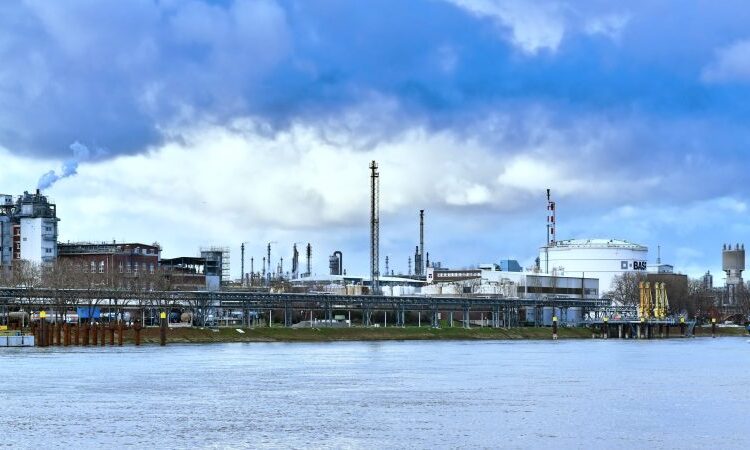
The EU’s industrial output as a share of total GDP will decline as a result of persistently high energy prices, the head of the world’s largest chemicals company has said, adding that such a “structural development” is not necessarily bad and may even be “healthy” for the European economy.
Speaking to reporters in Brussels on Monday (18 March), Martin Brudermüller, CEO of Germany-headquartered giant BASF, noted that energy-intensive European industries are “particularly” likely to be affected but stressed that deindustrialisation is too “harsh” a word to describe Europe’s current economic predicament.
“I would say the word ‘deindustrialisation’ is a very harsh one because it looks like everything is disappearing,” Brudermüller said following a question from Euractiv. “I think this is not the case. But what we will see definitely is that the share of industry contributing to GDP [will] most probably go down.”
“This is particularly [true] for the energy-intensive industries, and the chemical industry is one of them, but there is cement, there is steel, [and] there are several others.”
Echoing European Central Bank President Christine Lagarde’s suggestion last month that Germany’s manufacturing-heavy economic model needed “to be revamped”, Brudermüller conceded that the country in particular “will be less attractive for energy-intensive industries”.
“That’s why the share will go down. And that doesn’t mean that everything is going away. But yes, this industry most probably… will not go in Germany anymore. We have to deal with that.”
Overall, Brudermüller’s comments are likely to exacerbate fears that the EU’s current industrial slump may prove irreversible, after Russia’s full-scale invasion in February 2022 sent energy prices soaring across the bloc.
Eurostat, the bloc’s official statistics office, reported last week that year-on-year industrial output fell 5.7% in the EU in January. Germany, the bloc’s largest economy and an industrial powerhouse that was heavily reliant on cheap Russian energy prior to the Ukraine war, posted a 5.4% decline.
Against this backdrop, however, Brudermüller defended the importance of free-market competition, arguing: “I will say a structural development is healthy because sometimes a company, if they are not good, they actually disappear from the landscape.”
His remarks, delivered on the sidelines of an event hosted by the European Round Table for Industry, followed a panel discussion in which he urged EU policymakers to simplify the bloc’s regulatory system and suggested that Europe’s industrial competitiveness could be restored by letting the invisible hand of the market “do its magic”.
“I’m very concerned that the political instinct in Brussels and in most capitals still is to achieve change by prescriptive regulation,” he said. “And this will not work… The very real magic of the invisible hand is more than enough.”
‘We have to take costs down’
Brudermüller’s remarks also corroborate analysts’ warnings that energy-intensive industries like the chemical sector are especially likely to offshore production to China or the US to take advantage of cheaper energy prices over the coming months and years.
“Deindustrialisation is a clear and present danger, especially for energy-intensive sectors vital to downstream ecosystems,” Tobias Gehrke, a senior policy fellow at the European Council on Foreign Relations, told Euractiv earlier this year.
Fears of Europe’s potential deindustrialisation were compounded by Brudermüller’s own announcement just eight months after Russia’s invasion that BASF would “permanently” downsize its industrial headquarters in Ludwigshafen, located just south Frankfurt.
While cutting production in Germany, BASF is currently constructing a €10 billion petrochemical plant in Zhanjiang, in Guangdong province in southeast China. It is the 158-year-old company’s largest ever investment.
Such moves have been vehemently criticised by some European leaders for defying the EU’s official policy of “de-risking”, or cutting economic ties in strategically key economic sectors, from China.
BASF, in particular, makes a number of products including glues, solvents, and fertilisers that play a crucial role in numerous companies’ supply chains.
Brudermüller, who is set to leave BASF next month after six years in charge, vehemently defended the company’s decision to downsize its operations in Germany.
“[BASF is] highly dependent on the world but is losing money at home in Germany,” he said. “We have to partially restructure that. We have to take costs down. We have to shut down one or the other plant that is energy-intensive and not competitive anymore.”
Europe’s industrial woes come amid broader concerns about the general economic health of the eurozone — and particularly the German — economy.
Last month, the European Commission cut its 2024 growth forecast for the eurozone from 1.2% to 0.8%.
The downward revision came just the day after Germany slashed its own GDP forecast for 2024 from 1.3% to 0.2%, with German Economy Minister Robert Habeck describing the country’s economy as “dramatically bad”.
Earlier this month the European Central Bank issued an even more pessimistic forecast for the eurozone, cutting its growth projection for 2024 from 0.8% to 0.6%.
Europe’s industrial difficulties also come amid a broader, decades-long shift in Europe’s economy from manufacturing to services.
According to the World Bank, industry’s share of total EU GDP has fallen from 28.8% in 1991 to just 23.5% in 2022, the most recent year for which there is available data. Services’ proportion of total GDP has risen from 59% to 64.8% over the same period.
[Edited by Anna Brunetti/Zoran Radosavljevic]







